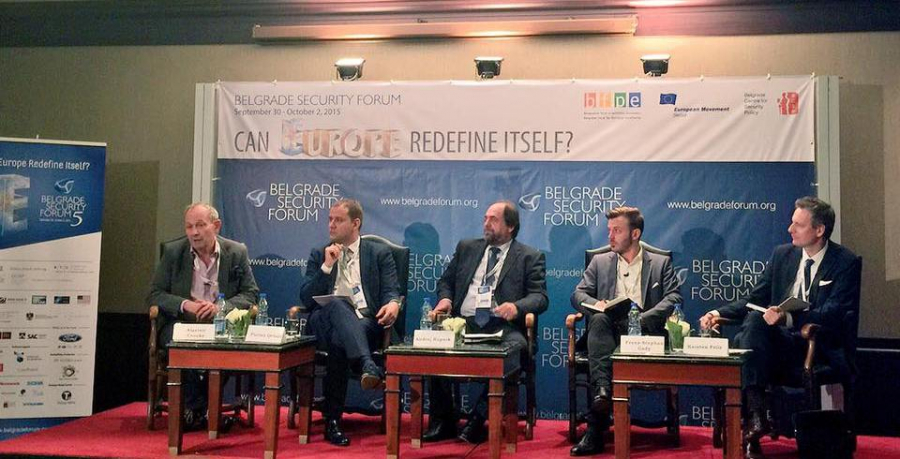2/10/2015

Kosovar Centre for Security Studies (KCSS) has contributed in two panel discussions at the Belgrade Security Forum 2015 (BSF), organized in Belgrade from the 30th of September to 2nd of October 2015.
The first panel on: “Understanding the Hydra of Radicalization” took place during the first day of the BSF. KCSS Director Florian Qehaja was part of the panel alongside other notable security experts working on radicalization, namely: Alastair Crooke‚ Founder and Director - Conflicts Forum, Andrej Rupnik‚ Senior Advisor - Geneva Centre for the Democratic Control and Armed Forces (DCAF) Ljubljana, and Franz-Stephan Gady‚ Senior Fellow - East-West Institute.
Florian Qehaja pointed out that the prevention of this particular problem hides in the excessive education of youth and students in least developed countries. This could prevent this target group from the wrong mindset that could lead them towards radical movements in their early adulthood. This is an easy but an extremely effective way. Moreover, Qehaja drew attention to the fact that it is of a crucial importance to approach and fight violent extremism before it becomes terrorism, while emphasizing the importance of counter narratives in preventing violent extremism in the case of Kosovo.
At the very end of another outstanding session the panelists agreed that the solution to the problem of radicalization that the entire world is confronted with is more than demanding. However, in the attempt to combat it to a certain extent societies need to work together, while including all sectors concerned, and by not expecting the police and the intelligence agencies to predict and prevent the problems on their own.
The second panel on: “The Privatization of the Security Sector in transforming Societies” took place during the second day of the BSF. Geneva Centre for the Democratic Control and Armed Forces (DCAF) with its 4 regional partners including KCSS investigated private security situation in the region. The first product of that cooperation is the “Force for Good’’, elaborating the private security sector in Kosovo, Albania, Bulgaria and Serbia.
The Session called Privatization of Security in Transforming Societies - Main Challenges to Democratic Governance focused on the mechanisms of Private Security Companies and state actors working together to ensure the delivery of quality security. Some of the questions that have been raised were whether states know how to provide private security; who is private security actors; and what were the positive concepts of cooperation between police and private security actors.
Rositsa Dzhekova‚ Coordinator, Security Program, Center for the Study of Democracy, Sofia pointed out that there are some guidelines and certain codes that could help countries in this region adopt private security. She compared situations in this sector as well as their problems, and gave very thorough insight in the current situation.